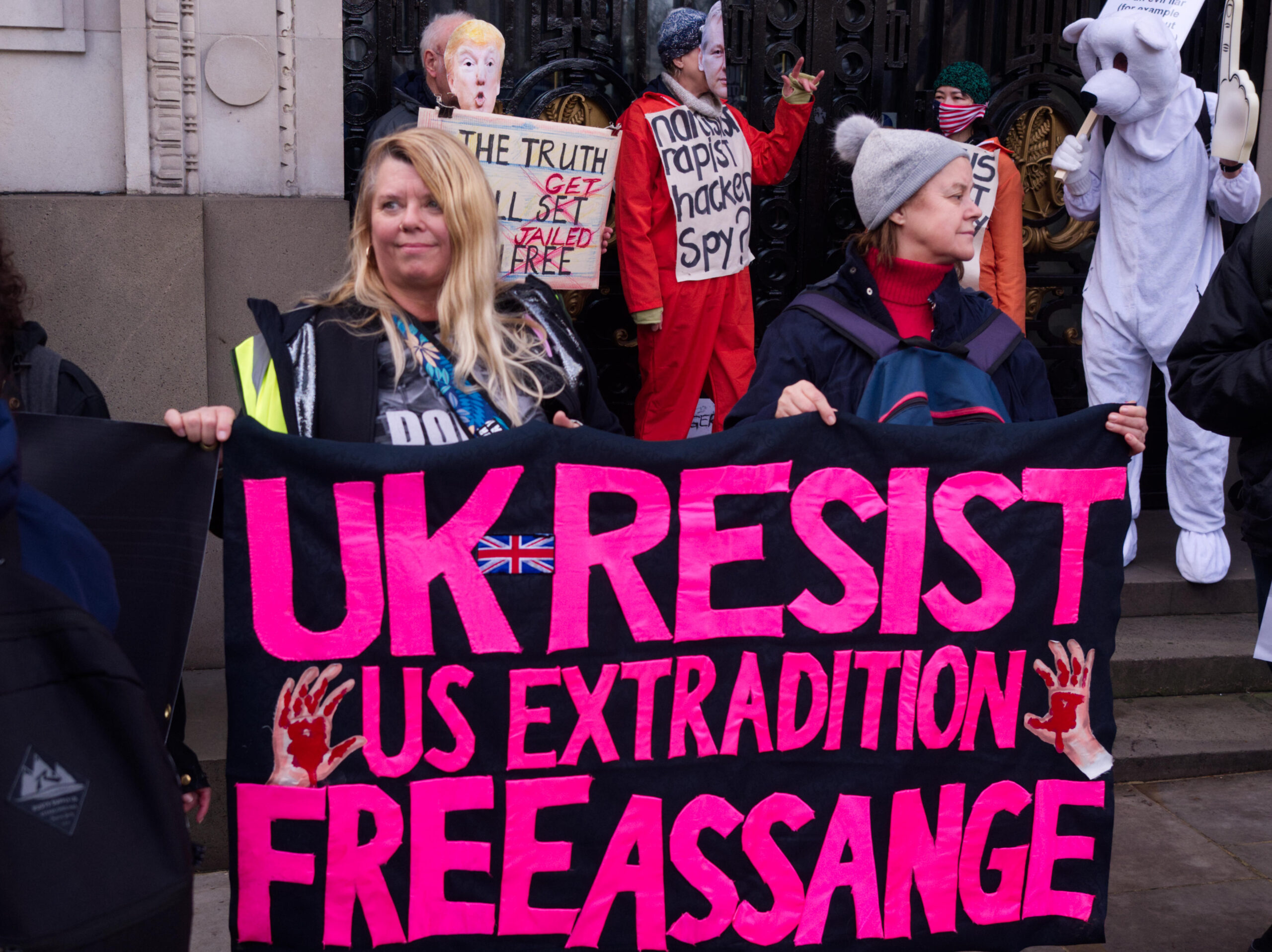Spring a leak: Assange’s case takes centre stage

Originally published in the Morning Star 7 September 2020
DURING an impasse in Julian Assange’s extradition hearing in February, I found myself sharing a bench in the court’s public area with three track-suited men in their early 20s. Another case being heard that day had brought them to Belmarsh. They were frenetically boisterous — perhaps a reaction to an alien environment.
Outside the court, chants from upward of 100 demonstrators intensified. “Don’t extradite Assange,” they chorused, accompanied by vuvuzelas and air horns. Ordinary conversation inside the building was momentarily drowned out.
“What’s that about?” asked one of the lads of his mates. He peered through the window at the banners and placards. The trio agreed that they had no idea.
It is illustrative of the challenge facing those of us campaigning for the extradition charges against the Wikileaks founder to be dropped.
Assange’s bombshell revelations were a decade ago. Few, if any, young adults have first-hand memory of the outrage of the “collateral murder” video, or the devastating revelations of the Afghan and Iraq war logs.
The resumption of proceedings today provides the opportunity for Assange’s legal team to imprint those outrages on the national consciousness. February’s hearings involved relatively arcane arguments over important, if sometimes baffling, legal principles. The coming three weeks will be dominated by witnesses called by Assange’s lawyers.
Whether these make the Australian’s case a touchstone issue remains to be seen. For the man in the dock, however, the stakes could scarcely be higher.
Between 2006 and 2010 Wikileaks published, or co-published with The Guardian, The New York Times and Der Spiegel, the most extraordinary catalogue of classified US military material. Its breadth was dizzying and included the involvement of US military in avoidable civilian deaths, the deliberate abuse of prisoners held at Guantanamo Bay and the secret use of drone strikes in Yemen.
By 2010, US authorities appear to have decided that Wikileaks must be stopped. Chelsea Manning, the US soldier who had disclosed nearly 750,000 classified records to Assange, was arrested. The Wikileaks founder, meanwhile, was accused of sexual assault in Sweden. Believing that the Swedish accusations, which he has always denied, were a pretext for his extradition to the US, in 2012 Assange sought sanctuary in the Ecuadorean embassy in London.
There he remained until 2019 when Ecuador allowed British police to enter the embassy and arrest him. Assange was initially jailed for breaching bail conditions seven years earlier. During this sentence, Swedish authorities discontinued their investigation of the sexual assault accusations.
An extradition request was subsequently filed by the US and it is to this that Westminster Magistrates, sitting at the Central Criminal Court, will return today.
The US wishes to prosecute Assange on 18 charges mostly arising from the Espionage Act. If convicted, these could result in a sentence of up to 175 years in prison, probably in solitary confinement with very limited access to family, friends or lawyers.
Unusually, over the summer, the US submitted a “superseding indictment” — fine tuning their case for extradition.
There is much that is troubling about the entire application. If allowed, it would legitimise the application of the US to prosecute foreign nationals whose writing or publication angered the State Department. It would allow for deportation on political grounds. And it would sanction extradition of a subject assessed to have been tortured and who is psychologically fragile.
Potential implications go well beyond the personal, of course. The general secretary of the National Union of Journalists Michelle Stanistreet has described the deportation request as “one of the gravest threats to free expression in my lifetime.”
Assange’s case against deportation will focus on the legal tests that the application fails.
During his time in the Ecuadorian embassy, for example, it is known that Assange was extensively bugged, including during meetings with his lawyers. The court will hear from former employees of UC Global, the Spanish company that installed the bugs. A key question will be to whom the footage from the secret camera was supplied. Some contend that the company was contracted by US security forces. Assange’s lawyers will argue that a fair trail in the US is impossible when a basic right like confidential access to lawyers has been violated.
The court will also hear from mental health experts, such as Michael Kopelman, the Emeritus Processor of Neuropsychiatry at Kings College London. Based on examinations undertaken in Belmarsh prison where Assange is held, he will report on the potentially devastating psychological impact of extradition. His evidence was considered key to computer scientist Lauri Love’s successful appeal against extradition to the US in 2018.
Outside court “team Assange” is also playing a more sophisticated game than has sometimes been the case. The exposure offered by his partner Stella Morris and their children is steadily humanising a central character who has often been harshly portrayed.
Until the intervention of Covid, the Don’t Extradite Assange Campaign boasted that each of its protests was bigger than the last. Without the pandemic a major rally would have filled Methodist Central Hall over the weekend. Its “Zoom” substitution was a bloodless proxy, albeit with interventions from Noam Chomsky, Daniel Ellsberg and Alice Walker.
Whether any of this persuades Judge Venessa Baraitser that Assange’s extradition would be unlawful is for the future. The hearings, slated for three weeks, could be extended. Baraitser’s decision will take longer still.
When the decision does come, if his plight is understood by the more distracted citizenry, then it will be no small victory. Indeed, while triumph in the court of public opinion delivers no cell-door key, it potentially serves a cause far beyond judicial reach.
Image: Tim Dawson